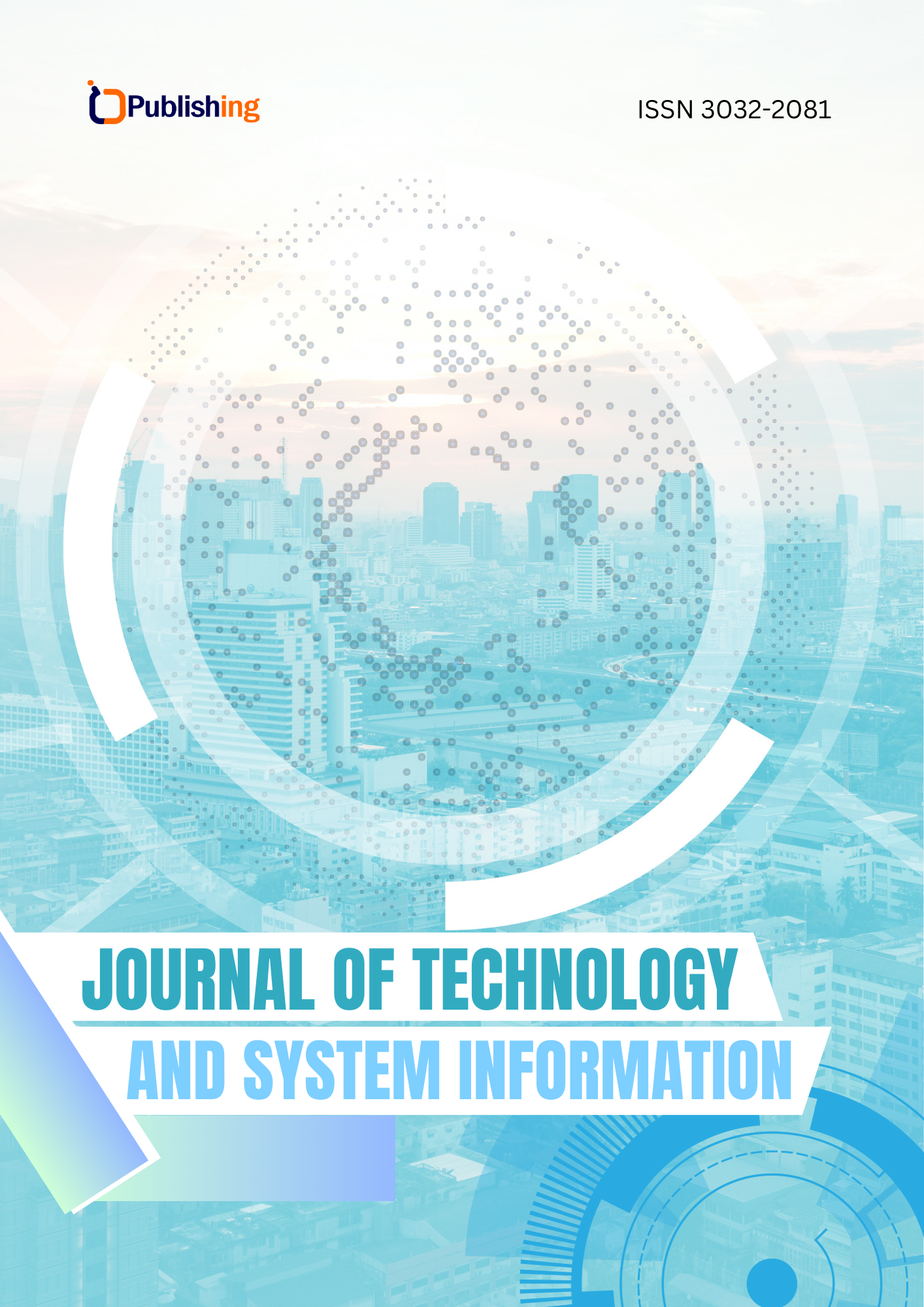Big Data and Predictive Analytics for Indonesia's Economic Transformation and Digital Resilience
DOI:
https://doi.org/10.47134/jtsi.v2i2.3774Keywords:
Big Data Analytics, Predictive Analytics, Digital Economy, Economic Transformation, Artificial Intelligence (AI) GovernanceAbstract
In an era defined by data, Big Data and Predictive Analytics have become indispensable tools for driving economic growth, innovation, and resilience. For Indonesia, one of Southeast Asia’s most dynamic digital economies, these technologies offer a transformative pathway to industrial modernization and global competitiveness. With over 212 million internet users and a digital economy projected to hit $146 billion by 2025, Indonesia is poised to harness the power of data to revolutionize sectors such as finance, healthcare, e-commerce, and manufacturing (Antara News, 2022). This study delves into the multifaceted landscape of Big Data in Indonesia, offering a comprehensive analysis of its economic potential and implementation challenges. It highlights how predictive analytics is reshaping industries, enabling businesses to optimize supply chains, enhance customer experiences, and mitigate risks with unprecedented precision. At the same time, it addresses pressing concerns such as data privacy, cybersecurity vulnerabilities, and the ethical implications of AI-driven decision-making. To unlock the full potential of Big Data, this study proposes actionable policy recommendations, including investments in data infrastructure, the development of ethical AI frameworks, and the expansion of STEM education and workforce training programs. Indonesia can create a long-term data ecosystem that balances innovation and responsibility by encouraging collaboration among government, industry, and academics. As Indonesia stands at the crossroads of the Fourth Industrial Revolution, the strategic integration of Big Data and Predictive Analytics is no longer optional—it is imperative. This study serves as a roadmap for Indonesia to harness the power of data, ensuring that these technologies drive not only economic growth but also inclusive development and digital resilience in an increasingly data-driven world.
References
Aljohani, A. (2023). Predictive analytics and machine learning for real-time supply chain risk mitigation and agility. Sustainability, 15(20), 15088.
Aljohani, A. (2024). Deep learning-based optimization of energy utilization in IoT-enabled smart cities: A pathway to sustainable development. Energy Reports, 12, 2946-2957.
Antara News. (2022, January 20). Indonesia's digital economy to reach $146 billion in 2025: President. Retrieved February 17, 2025, from https://en.antaranews.com/news/204589/indonesias-digital-economy-to-reach-146-billion-in-2025-president
Badi, S. (2024). IoT and Big Data Analytics: Revolutionizing Business and Society with Advanced Insights. International Journal of Applied Mathematics and Computer Science (ISSN: 2083-8492), 3(1), 42-56.
Brynjolfsson, E., Jin, W., & McElheran, K. (2021). The power of prediction: Predictive analytics, workplace complements, and business performance. Business Economics, 56, 217-239.
Buchanan, J. M., & Tullock, G. (1965). The calculus of consent: Logical foundations of constitutional democracy (Vol. 100). University of Michigan Press.
Bughin, J. (2018). Skill Shift: Automation and The Future of the Workforce. McKinsey Global Institute.
Chen, H., Chiang, R. H., & Storey, V. C. (2012). Business intelligence and analytics: From big data to big impact. MIS Quarterly, 1165-1188.
Davenport, T. H., & Bean, R. (2022, February). Why becoming a data-driven organization is so hard. Harvard Business Review. https://hbr.org/2022/02/why-becoming-a-data-driven-organization-is-so-hard
Davenport, T. H., & Kirby, J. (2023, September). Reskilling in the age of AI. Harvard Business Review. https://hbr.org/2023/09/reskilling-in-the-age-of-ai
Del Vecchio, P., Mele, G., Ndou, V., & Secundo, G. (2018). Open innovation and social big data for sustainability: Evidence from the tourism industry. Sustainability, 10(9), 3215.
du Plooy, E., Casteleijn, D., & Franzsen, D. (2024). Personalized adaptive learning in higher education: A scoping review of key characteristics and impact on academic performance and engagement. Heliyon.
European Commission. (2018). Legal framework for EU data protection. Retrieved February 17, 2025, from https://commission.europa.eu/law/law-topic/data-protection/legal-framework-eu-data-protection_en
European Commission. (2021). European data strategy. Retrieved February 17, 2025, from https://commission.europa.eu/strategy-and-policy/priorities-2019-2024/europe-fit-digital-age/european-data-strategy_en
European Commission. (2022). Digital Skills and Jobs Coalition. Retrieved February 17, 2025, from https://digital-skills-jobs.europa.eu/en/about/digital-skills-and-jobs-coalition
Federal Trade Commission. (2025, January). Behind the FTC's $6B report: Large AI partnerships and investments. FTC. https://www.ftc.gov/policy/advocacy-research/tech-at-ftc/2025/01/behind-ftcs-6b-report-large-ai-partnerships-investments
Fortune Business Insights. (2025). Big data analytics market. Retrieved February 17, 2025, from https://www.fortunebusinessinsights.com/big-data-analytics-market-106179
IBM. (2024, February 20). Artificial intelligence in business. Retrieved February 17, 2025, from https://www.ibm.com/think/topics/artificial-intelligence-business
International Telecommunication Union. (2022). Global connectivity report 2022. Retrieved February 17, 2025, from https://www.itu.int/itu-d/reports/statistics/global-connectivity-report-2022/
Kahneman, D., & Tversky, A. (2013). Prospect theory: An analysis of decision under risk. In Handbook of the Fundamentals of Financial Decision Making: Part I (pp. 99-127).
Kemp, S. (2020, February 18). Digital 2020: Indonesia. DataReportal. https://datareportal.com/reports/digital-2020-indonesia
Lazuardi, L., Sanjaya, G. Y., Ali, P. B., Siahaan, R. G. M., Achmad, L., & Wulandari, H. (2021, July). Interoperability of health digitalization: Case study on use of information technology for maternal and child health services in Indonesia. In Business Information Systems (pp. 317-327).
Manyika, J. (2011). Big data: The next frontier for innovation, competition, and productivity. McKinsey Global Institute.
McKinsey & Company. (2021, May 21). Holistic customer assistance through digital-first collections. Retrieved February 17, 2025, from https://www.mckinsey.com/capabilities/risk-and-resilience/our-insights/holistic-customer-assistance-through-digital-first-collections
McKinsey Global Institute. (2024). A new future of work: The race to deploy AI and raise skills in Europe and beyond. Retrieved February 17, 2025, from https://www.mckinsey.org/mgi/our-research/a-new-future-of-work-the-race-to-deploy-ai-and-raise-skills-in-europe-and-beyond
World Economic Forum. (2023). The future of jobs report 2023. World Economic Forum. https://www.weforum.org/publications/the-future-of-jobs-report-2023/
World Health Organization. (2021). Global status report on the public health response to dementia 2021. World Health Organization. https://iris.who.int/bitstream/handle/10665/342703/9789240027053-eng.pdf
Downloads
Published
How to Cite
Issue
Section
License
Copyright (c) 2025 Kurniawan Arif Maspul, Nugrahani Kartika Putri

This work is licensed under a Creative Commons Attribution 4.0 International License.










